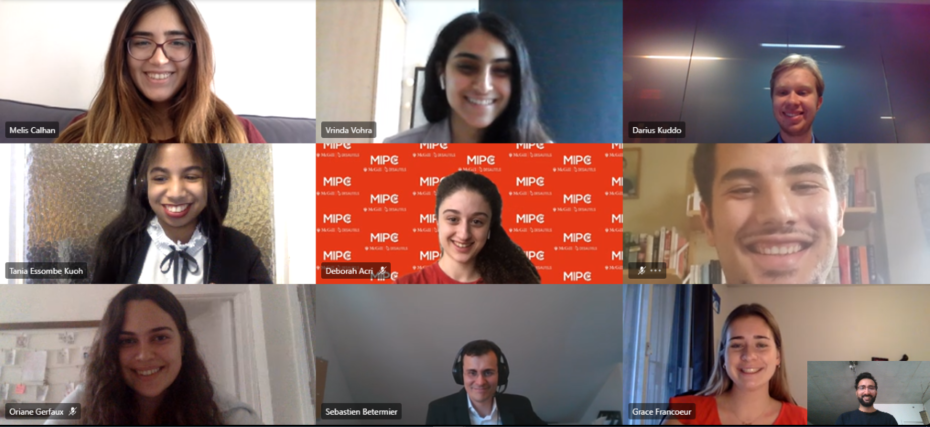
When a class of pension investment students at the Desautels Faculty of Management created the case study for the 2020 McGill International Portfolio Challenge (MIPC), they chose to focus on themes of social inequality and protectionism. At the time, they had no way of knowing that COVID-19 was just around the corner. “The topics of inequalities and protectionism are always relevant, but this year has made it abundantly clear that there are new dimensions to address,” said Tania Kuoh, who served as co-executive director of MIPC 2020 alongside Darius Kuddo, a fellow BCom student.
Rising to the challenge of the moment
Devised by Sebastien Betermier, an associate professor of Finance, the MIPC leverages the talents of student teams from around the world to develop strategic solutions for institutional funds. A powerhouse roster of executives – including representatives from the Canadian pension funds Caisse de dépôt et placement du Québec, CN Investment Division, CPP Investments, OTPP, and PSP Investments – judges 25 semi-finalists and five finalists vying for more than $50,000 in prize money.
Every year, the MIPC presents a complex portfolio construction problem that immerses students in an emerging facet of impact investing. Last year’s competition illuminated the complexity of investing in more environmentally sustainable sources of energy. This year presented a fictitious sovereign wealth fund in the UK, the British National Strategic Fund, and asked students to develop an investment strategy and asset allocation framework in the context of the country’s withdrawal from the EU.
The case study featured a unique triple mandate to make the UK more economically independent and equal while generating risk-adjusted returns over the long-term. “We have actually learned of ongoing discussion to launch a real new sovereign wealth fund in the UK that is similar to the BNSF,” shared Betermier. “Now we have a golden opportunity to shape the debate in a time that is especially difficult because of the COVID-19 crisis.”
Omer Juma, a project manager at the Marcel Desautels Institute for Integrated Management, planned the MIPC alongside Kuddo, Kuoh, and their team of BCom students. Juma says this year’s case competition drew record levels of participation because of, not in spite of, the ongoing challenges of COVID-19 and Brexit. “As the COVID-19 pandemic exacerbates existing social inequalities, the topic is already on people’s minds,” he reflected. “Given the added complexity of Brexit, questions of protectionism were also especially timely this year. The themes were a major sell for our participants.”
Going virtual
Instead of postponing the competition, the organizers of the MIPC decided to run the event virtually for the first time. “After hearing from returning universities and sponsors about their goals for the event, we went into design-thinking mode and began to envision unique ways we could leverage technology to maintain the level of interaction our participants had come to expect,” said Juma.
By all accounts, the virtual component of this year’s MIPC went off without a hitch. “The MIPC student team put in an enormous effort to redesign the change in a virtual setting,” Betermier affirmed. “Their hard work paid off.” The organizers of the MIPC went beyond the task of translating presentations to a virtual format as they implemented a new mentorship program, created new avenues for recruitment for both MIPC and McGill students, and organized a five-day speaker series.
One of the speaker series events featured a panel on diversity and inclusion in the world of finance. “Our team has worked hard to make the MIPC more diverse, particularly in terms of gender balance and geography,” said Betermier. “We are still receiving data on the student teams, but we have already noticed an increase in female participation – from 31 to 42 percent – and a greater proportion of teams from developing countries.”
According to Tanya Kuoh, the theme of this year’s case added fresh urgency to the need for diversity in a competition that had previously only included participants who could shoulder the cost of traveling to Montreal for the semifinal and final rounds of judging. “The case itself pushed us to address the inequalities perpetuated by our challenge, and we made conscious efforts to make it more accessible to students,” she shared. “Ultimately, having greater diversity within the challenge created richer discussions, which made for a more impactful experience.”
Regardless of whether the MIPC returns to an in-person format next year, its organizers predict that some virtual elements will remain in place. “A virtual format allowed us to be able to record and publish a lot of the high-quality content we generated, not only to benefit participants in different time zones, but also to expand the reach and the impact of the challenge globally,” reflected Darius Kuddo.
Taking home the prize
Five teams competed in the November 6 finals. In the end, two teams emerged victorious: a team from Nanyang Technological University in Singapore and a solo entry from Boccoli University in Italy. “Both winners created a top-down structure for how to think about the triple impact requirement that was well-integrated and easy to understand,” revealed Betermier. The two winners shared the $30,000 top prize, while another $20,000 went to reward the runner-up proposals, best speakers, and five other team proposals that distinguished themselves in a particular area, including exceptional quantitative analysis, storytelling, and diverse perspectives.
“Thanks to our dedicated student leaders, sponsors, and participants, the MIPC now has a four-year track record of mobilizing student talent and leadership on complex societal issues,” concluded Betermier. “As the COVID-19 crisis continues to make these issues even more complex, we are looking forward to seeing the ways in which our students’ efforts inform the larger conversation.”
